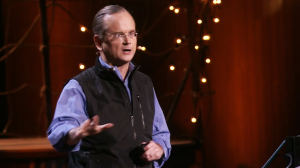In The New York Times today, Nicholas Confessore writes that the super PAC to end super PACs is leaping into the fray with $12 million dollars to back candidates who support campaign finance reform. One of the group’s founders, Harvard professor and activist Lawrence Lessig, has a slogan for his initiative: “Embrace the irony.”

Lawrence Lessig delivers a TED talk: "We the People, and the Republic we must reclaim"
In Congress, the allies are urging lawmakers to support legislation like the Government by the People Act, sponsored by Representative John Sarbanes, Democrat of Maryland, and the Citizen Involvement in Campaigns Act, sponsored by Representative Tom Petri, a Wisconsin Republican. Both measures offer tax credits or vouchers to people who make small donations. To win Mayday’s support — or fend off the group’s planned attack ads — candidates need only endorse one of these measures.
The limited requirements for the super PAC’s support are intended, in part, to help Mayday enlist more Republicans. Party leaders like Senator Mitch McConnell and conservative legal scholars are deeply opposed to proposals that would diminish money in campaigns, arguing that they are an infringement on free speech and healthy political competition. Mr. Rubens, for example, is in favor of giving voting-age citizens a $50 tax rebate check every two years to be spent on candidate contributions.
“If we accepted the responsibility of funding our elections through systems supporting small dollar donations — if all of us were relevant participants in the process — that would radically change the way in which policy in Washington is made,” Lessig explained to BillMoyers.com’s Joshua Holland earlier this year.
“And that change is completely constitutional, even with this Supreme Court. There’s nothing the Supreme Court has said that would invalidate, for example, a voluntary voucher system where everybody had a $50 or $100 dollar voucher, which they could give to candidates who voluntarily opted into a system of small dollar contributions. This Court has again and again indicated that kind of reform is perfectly constitutional.”
The Times’ Confessore continues:
Mayday’s founders believe that rank-and-file Republicans are more open to limiting the impact of big contributions than their leaders are. Mr. McKinnon worked with Juleanna Glover, a Republican lobbyist and former George W. Bush aide, and Trevor Potter, a Republican lawyer who founded the Campaign Legal Center, to interview 60 Republican and conservative leaders, strategists and activists for their views on money and politics.
They found that Mr. Obama’s ability to outraise Republican presidential candidates in two straight elections had cut against a common belief in Republican circles that unlimited campaign fund-raising and spending gave their party an advantage. At the same time, some of the respondents told them that Republicans’ support for unrestrained campaign money was cementing public suspicion that the party catered to the wealthy.
“Now marry that with the idea that conservatives are realizing that we don’t really have a free public policy market, and the reason for that is directly tied to money,” Mr. McKinnon said in an interview. “The whole idea of crony capitalism is getting a lot of equity in the party right now.”
Read the full piece at The New York Times »
Last January, Lessig and others concerned about the influence of money in politics marched across New Hampshire to raise awareness about the issue. Moyers & Company’s cameras followed them on that journey. Watch that segment »

